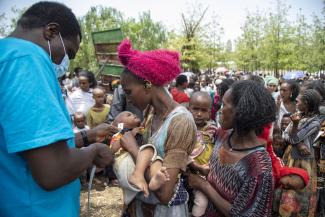Humanitarian emergency
Crisis in Ethiopia intensifies

The conflict began in November 2020 with armed clashes between the Ethiopian central government and the regional government of Tigray (see my article in D+C/E+Z e-Paper 2021/01, Debate section). At that time, there was already a food shortage, caused by a plague of locusts in the previous year. Then there was the Corona pandemic, which has not abated to this day.
The parties to the conflict are, on one side, the armed forces of the Tigray People’s Liberation Front (TPLF) and, on the other side, the Ethiopian armed forces (ENDF), the Eritrean army (EDF) and militias from neighbouring regions. In addition to the military clashes, a propaganda battle is increasingly raging over the narrative of who plays which role in the conflict and who is responsible for which atrocities and massacres.
Humanitarian aid has become a political issue and the civilian population a pawn in the battle for global public opinion. The central government denounces one-sided reporting by the west and refuses any outside intervention. Diplomatic relations with key allies and neighbouring countries are at an all-time low. Experts, politicians and journalists usually exacerbate the already deeply entrenched divisions. Ethiopia is threatened with ever increasing isolation.
The sharp dispute over the credibility of opponents is not a by-product of the war but its actual starting point. Large sections of the population suspect that former political cadres were behind political unrest between 2018 and 2020. Until Prime Minister Abiy Ahmed took office in 2018, the TPLF had dominated Ethiopia’s politics for years through violence, censorship and repression.
Due to decades of human-rights violations, large parts of the population have a strong aversion to the former government. Many see the current violence between ethnic groups as a consequence of the TPLF’s divide-and-rule strategy, which elevated ethnic federalism to constitutional status.
Today, Abiy Ahmed and his supporters seek to overcome the ethnic tension through centralisation, and they believe that this cannot be achieved with a TPLF that continues to foster these tensions. In Tigray itself, however, recent events and fears of generalised violence directed at their own ethnic group have caused ranks to close behind the TPLF.
The bottom line is that this is a power struggle between politicians who are former guerrilla fighters or see themselves as following this tradition and who use all means to discredit their opponents. Since the beginning of the conflict, the TPLF has portrayed the famine as deliberate and part of an attempted genocide by the Ethiopian central government. The Abiy government in turn blames the TPLF for the miserable conditions, the violence and the blocking of access routes – without admitting that a multitude of players are increasingly out of control.
Any trust that opponents will deal in good faith has been completely lost. Reports of massacres, torture, mass rapes and other crimes by one side are consistently denounced as propaganda by the other. Those who condemn the acts automatically are seen as the mouthpiece of the opponents and thus reaffirm the belief in a conspiracy against one’s own camp.
Government supporters see relief operations for Tigray or camps for Ethiopian refugees as a smokescreen for supporting the TPLF. Following blockages and attacks on aid convoys, unknown individuals murdered three staff members of Doctors Without Borders, an NGO, in June. In August the central government revoked the licences of several NGOs, accusing them of spreading misinformation. The UN responded by condemning the generalised bashing of humanitarian organisations.
The dilemma now is that humanitarian aid is urgently needed, but any intervention from outside potentially worsens the emergency. The international community must quickly find alternatives to the current approach to protect the local population from even more suffering.
Markus Rudolf is a senior researcher at the Bonn International Center for Conversion (BICC).
markus.rudolf@bicc.de








